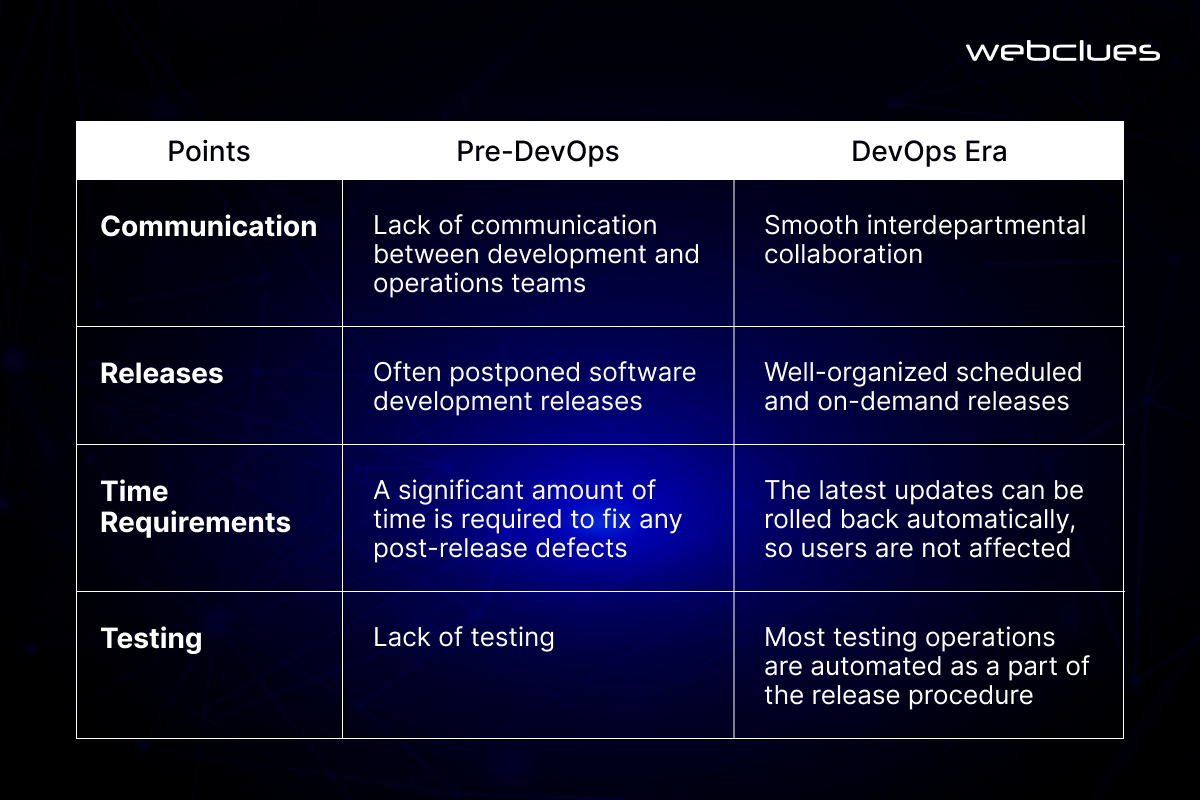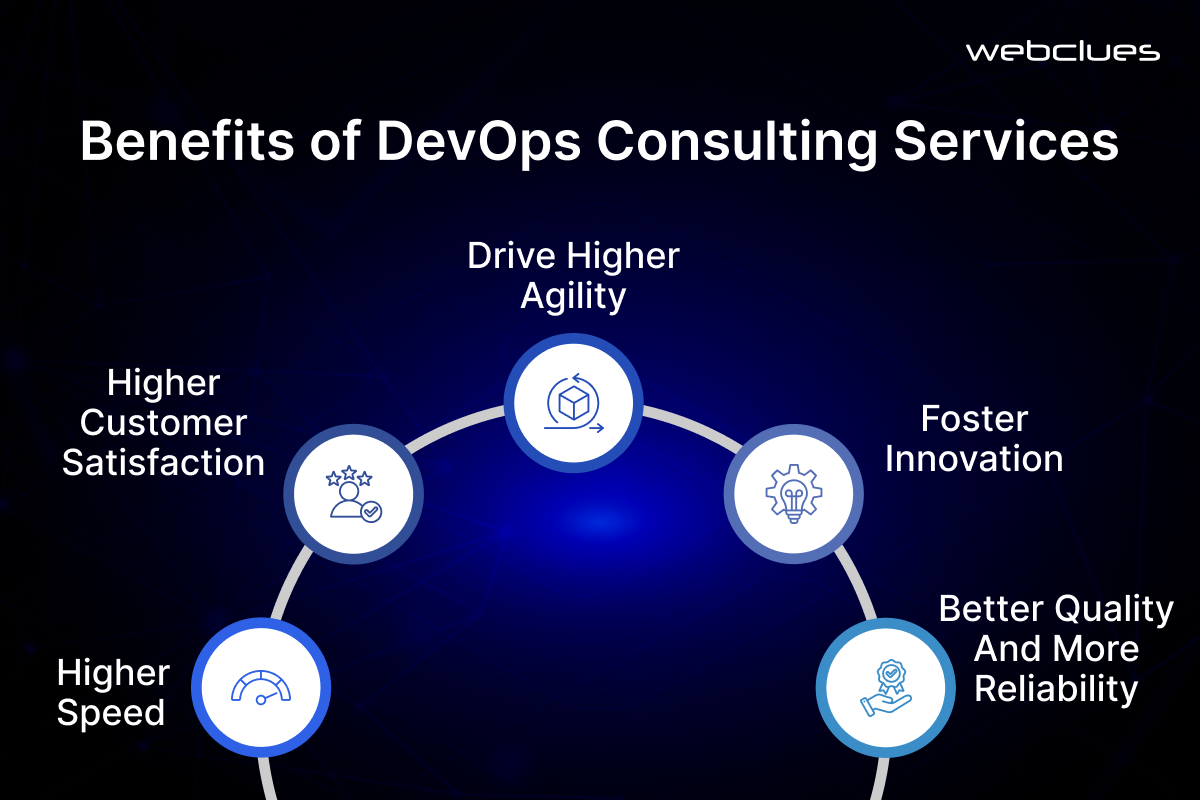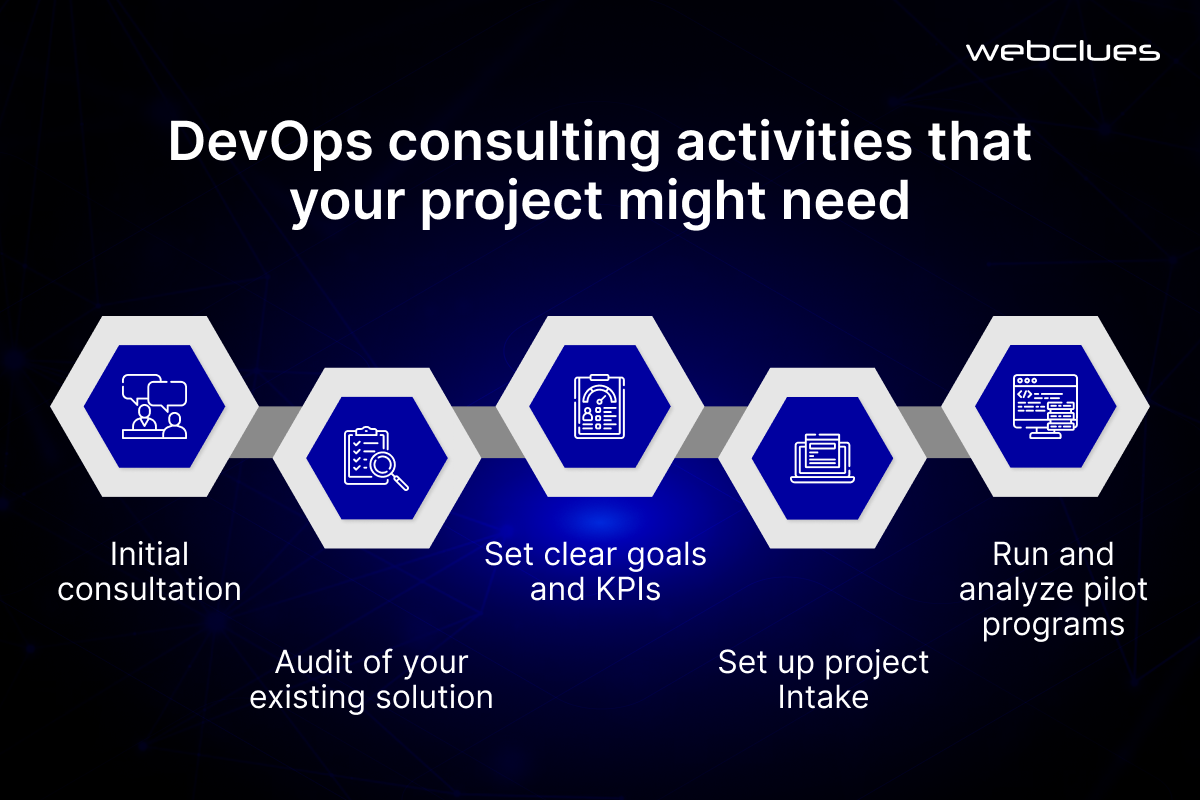The Role of DevOps Consulting in Modern Software Development
-min.png)
The technology industry thrives on constant innovation. With the tech environment getting more competitive by the day, businesses are under immense pressure to deliver software features and updates faster than ever before. This rapid pace requires optimized development processes that can adapt to evolving user needs and market demands. Traditional development methodologies, often characterized by isolated teams and manual processes, struggle to meet these demands.
DevOps offers a compelling solution to this challenge. DevOps is not just a set of tools; it’s a cultural shift that emphasizes collaboration and automation throughout the software development lifecycle. By bridging the gap between development and operations teams, DevOps promotes a shared responsibility for software quality and delivery. This collaborative approach allows organizations to automate manual tasks, optimize workflows, and achieve faster deployments with higher quality.
However, adapting to this cultural shift and implementing effective DevOps practices can be complex and challenging. DevOps consulting services play a crucial role in this. By providing expertise and guidance, DevOps consultants can help organizations assess their current development ecosystem, define a customized DevOps strategy, and implement the necessary tools and processes for a successful transformation.
The Bottlenecks of Traditional Development
While traditional methodologies have been effective, they often struggle to keep pace with the demands of modern software development. One of the primary challenges is the isolated nature of development and operations teams.
In these traditional models, development teams focus on writing code and building features, often with limited visibility into the operational aspects of deployment and maintenance. Conversely, operations teams are tasked with managing infrastructure and ensuring application uptime, often receiving code releases with minimal context or preparation. This lack of communication and collaboration creates several bottlenecks throughout the development cycle.
Firstly, isolated teams can lead to communication breakdowns. Developers may not be aware of the operational constraints faced by the ops team, resulting in code that's difficult to deploy or maintain. Conversely, ops teams may not fully understand the functionalities being developed, making troubleshooting and issue resolution cumbersome.
Secondly, integration and testing become afterthoughts, often happening late in the development cycle. This reactive approach can lead to bugs and defects slipping through the cracks, causing delays and rework. Additionally, scaling applications to meet increased demand becomes challenging due to a lack of collaboration on infrastructure planning and resource allocation.
The consequences of these bottlenecks are considerable and extensive. Traditional development methodologies often suffer from slow time-to-market, as feature releases get bogged down in lengthy integration and testing phases. Increased errors and bugs lead to a poor user experience and require additional resources for resolution. Finally, scaling applications becomes a major challenge, hindering the ability to adapt to growing user bases and market demands. These limitations highlight the critical need for a more collaborative and optimized approach to software development, making way for the benefits that DevOps services can offer.
DevOps as a Solution
DevOps offers a solution to the challenges posed by traditional development methodologies. DevOps focuses on collaboration, automation, and continuous improvement throughout the software development lifecycle. Here, we explore the core principles of DevOps and how they address the limitations discussed above.
- Collaboration
By encouraging a shared responsibility model, DevOps encourages open communication and a shared understanding of the entire software development process. Developers gain valuable insights into operational realities, allowing them to write code that's easier to deploy and maintain. Conversely, operations teams become more involved in the development process, allowing them to proactively prepare for new features and integrations.
- Automation
DevOps heavily harnesses automation to optimize repetitive tasks. This can include automated code testing, infrastructure provisioning, and deployment pipelines. By automating these tasks, DevOps allows teams to focus on higher-value activities like innovation and feature development. Additionally, automation reduces human error and facilitates consistency throughout the development process.
- Continuous Integration and Delivery (CI/CD)
A central tenet of DevOps is CI/CD. CI involves frequent code integration from developers, promoting early detection and resolution of bugs. CD focuses on automating the deployment process, allowing for faster and more frequent releases with lower risk. This continuous feedback loop helps teams deliver higher-quality software at a much faster pace.
There are a number of benefits of adopting DevOps. Faster deployments allow organizations to get features and updates into users’ hands quicker, leading to increased innovation and differentiation. Improved product quality, achieved through continuous integration and automated testing, translates to a better user experience and fewer bug fixes in the long run. Cloud DevOps services also facilitate increased agility, allowing organizations to adapt to changing market demands and user needs with greater flexibility. Finally, by automating tasks and optimizing processes, DevOps can lead to significant cost reductions in software development and maintenance.
Where DevOps Consulting Comes In
Successfully implementing DevOps requires careful planning and execution. This is where DevOps consulting services come into play. DevOps consultants act as trusted advisors, guiding organizations through their DevOps transformation journey.
- Assessment
The first step involves a thorough assessment of your current development environment. Consultants will analyze your existing tools, processes, and team structures to identify areas for improvement. This assessment provides a clear understanding of your DevOps maturity level and helps define realistic goals for your transformation.
- Roadmap Development
Based on the assessment findings, DevOps consultants work collaboratively with your teams to develop a customized DevOps roadmap. This roadmap outlines a phased approach for implementing DevOps practices, customized to your specific needs and resources. It defines key milestones and identifies the tools and technologies that will best support your DevOps journey.
- Tool Selection & Integration
The diverse array of DevOps tools can be overwhelming. DevOps consultants provide expertise in selecting the right tools for your organization. This may include CI/CD platforms, configuration management tools, and monitoring solutions. They ensure these tools integrate smoothly with your existing infrastructure, leading to a smooth and efficient workflow.
- Cultural Transformation
Consultants can facilitate workshops and training sessions to promote collaboration and a shared DevOps mindset within your teams. This cultural transformation is crucial for breaking down silos and promoting a sense of shared responsibility for software quality and delivery.
- Security & Compliance Integration
Security considerations are crucial when it comes to modern software development. DevOps consultants make sure that security best practices and compliance requirements are embedded throughout the DevOps lifecycle. They help integrate security testing tools and practices within your CI/CD pipelines, allowing for secure and compliant software delivery.
- Automation for Efficiency
A core principle of DevOps is automation. Consultants help identify manual tasks that can be automated to streamline workflows and improve efficiency. This could involve automating infrastructure provisioning, code deployment, and testing processes, freeing up your teams to focus on higher-value activities.
- Engagement Models
DevOps consulting services can be delivered through various engagement models. On-site consultants work directly with your teams within your office. Remote consultants provide expertise virtually, offering a cost-effective option. Hybrid models combine on-site and remote support, catering to your specific needs.
Real-World Impact: Case Studies/Success Stories
DevOps consulting has had a far-reaching impact on numerous successful businesses. Here are some case studies showcasing how companies achieved significant improvements through strategic partnerships with DevOps consultants.
Netflix
The streaming giant Netflix is renowned for its rapid development and deployment cycles. A core factor behind this success is their embrace of DevOps principles. Netflix partnered with DevOps consultants to implement a highly automated CI/CD pipeline leveraging open-source tools like Spinnaker and Hygieia. This approach allowed Netflix to achieve an industry-leading feat of deploying code multiple times per day, ensuring a continuous stream of new features and bug fixes for their subscribers.
Amazon
The e-commerce titan Amazon is a prime example of DevOps adoption at scale. To maintain agility and innovation across its vast product portfolio, Amazon heavily invests in DevOps practices. They harness a custom-built suite of DevOps tools that automate infrastructure provisioning, testing, and deployment across numerous Amazon Web Services (AWS) accounts. This investment has resulted in a significant reduction in lead time for new feature releases, allowing Amazon to experiment and iterate rapidly to meet ever-evolving customer demands.
Spotify
The music streaming service Spotify thrives on delivering a hassle-free user experience. To achieve this, they heavily rely on DevOps principles. Spotify partnered with DevOps consultants to implement an efficient monitoring and alerting system integrated with their CI/CD pipeline. This allows them to proactively identify and address potential issues before they impact user experience. Through this approach, Spotify boasts an impressive uptime record and the ability to quickly resolve any issues that may arise.
What to Look for in a DevOps Consulting Partner
Having understood how transformative DevOps consulting can be for your software development process, the next crucial step is selecting the right partner for your organization. Here are key factors to consider when making this decision.
- Expertise & Proven Experience
Look for a consulting partner with a demonstrably strong track record in DevOps implementations. Seek out case studies that showcase their experience in tackling challenges similar to those you face. Verifiable references from satisfied clients who have achieved successful DevOps transformations can provide valuable insights. Certifications and industry recognition can also be indicators of their expertise.
- Cultural Alignment is Key
A successful DevOps transformation requires more than just technical expertise. It's crucial to choose a consulting partner who understands your company culture and can facilitate the smooth adoption of DevOps practices. Look for a team that can effectively communicate and collaborate with your existing development and operations teams. A collaborative approach promotes trust and ensures everyone is on the same page throughout the transformation process.
- Technology Stack Alignment
The ideal consulting partner will have a strong understanding of the tools and technologies within your existing infrastructure. This allows them to recommend DevOps solutions that integrate efficiently with your current environment. While some consultants may advocate for entirely new toolsets, a practical approach that leverages your existing investments can be highly beneficial.
The Future of DevOps Consulting
The DevOps consulting space is developing consistently. Here are some of the most prominent emerging trends.
- Cloud-Native DevOps
As cloud adoption continues to rise, cloud-native DevOps practices are gaining traction. This approach utilizes containerization technologies and cloud-based CI/CD pipelines for a truly scalable and elastic development environment.
- Infrastructure as Code (IaC)
IaC empowers you to treat infrastructure as code, allowing for automated provisioning and management. This approach aligns perfectly with DevOps principles, promoting consistency and repeatability throughout the development lifecycle.
- Security Integration
Security considerations are crucial in the DevOps lifecycle. The future of DevOps sees a growing emphasis on integrating security best practices and automation tools within the CI/CD pipeline. This ensures that security vulnerabilities are identified and addressed early in the development process.
- AIOps and GitOps
Artificial Intelligence (AI) and Operations (AIOps) are another emerging trend. AIOps utilizes machine learning to automate tasks like monitoring, anomaly detection, and incident resolution within the DevOps lifecycle. Additionally, GitOps is gaining momentum as a version control approach for infrastructure management, ensuring configuration consistency and simplifying rollbacks.
These trends highlight the continuous evolution of DevOps. As a leading provider of DevOps consulting services, we at WebClues stay up to date with these advancements. Our team of experts possesses the knowledge and experience to guide your organization through a successful DevOps transformation, customized to your specific needs and goals.
Hire DevOps engineers with us or Contact us today to explore how our comprehensive DevOps consulting services can help you achieve faster deployments, higher-quality software, and a competitive edge when it comes to modern software development.
Build Your Agile Team
Hire Skilled Developer From Us
Get a customized roadmap to DevOps success with our expert consulting services.
If you're looking for a roadmap to DevOps success with our expert consulting services, we can help. At WebClues, we'll guide you toward faster deployments, higher-quality software, and a future-proof development process.
Get a Quote!Our Recent Blogs
Sharing knowledge helps us grow, stay motivated and stay on-track with frontier technological and design concepts. Developers and business innovators, customers and employees - our events are all about you.
Contact
Information
Whether you're building next door or across time zones, we stay close in ideas, in execution, and in support.
India

Ahmedabad
1007-1010, Signature-1,
S.G.Highway, Makarba,
Ahmedabad, Gujarat - 380051
Rajkot
1308 - The Spire, 150 Feet Ring Rd,
Manharpura 1, Madhapar, Rajkot, Gujarat - 360007
UAE
Dubai
Dubai Silicon Oasis, DDP,
Building A1, Dubai, UAE
USA
Atlanta
6851 Roswell Rd 2nd Floor, Atlanta, GA, USA 30328
New Jersey
513 Baldwin Ave, Jersey City,
NJ 07306, USA
California
4701 Patrick Henry Dr. Building
26 Santa Clara, California 95054
Australia
Queensland
120 Highgate Street, Coopers Plains, Brisbane, Queensland 4108
UK
London
85 Great Portland Street, First
Floor, London, W1W 7LT
Canada
Burlington
5096 South Service Rd,
ON Burlington, L7l 4X4
Let’s Transform Your Idea into Reality. Get in Touch





